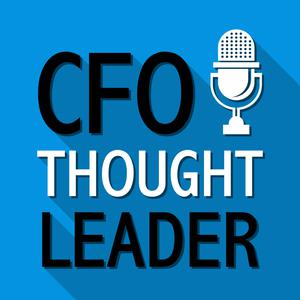
CFO THOUGHT LEADER
The Future of Finance is Listening
- 29 minutes 22 secondsBonus Episode: Three Leaders
In this special holiday episode of CFO Thought Leader, host Jack Sweeney shares three unique CFO beginnings that highlight the power of perseverance, determination, and meaningful connections. First, CFO Scott Healy recounts his father’s unwavering belief in trying and shares how his deaf brother’s relentless pursuit of success influenced his own leadership approach. Next, CFO Tracy Curley reveals how her path from West Point to motherhood in part shaped her trailblazing mindset. Curley’s experience as a non-traditional student underscores the value of supportive mentors and the importance of balancing professional commitments. Finally, CFO Svai Sanford describes his journey from war-torn Laos to the United States, overcoming formidable obstacles to achieve academic and professional success with the help of caring foster parents. Through these uplifting stories, the episode spotlights the human dimensions of leadership and reminds us how origins can profoundly inspire a CFO’s journey, inviting listeners to reflect on perseverance and gratitude.
25 December 2024, 8:00 am - 49 minutes 42 seconds1059: Future-Proofing Finance: Essential CFO Priorities for 2025 | Eliran Glazer, CFO, Monday.com
monday.com CFO Eliran Glazer highlights three vital priorities for 2025. First, he stresses that long-term efficiency must guide strategy. Instead of focusing solely on near-term investor demands, CFOs must structure financial planning like a marathon—mapping out sustainable growth through transparent scenario planning that accounts for macro uncertainties. Second, Glazer emphasized that CFOs need to become tech experts. With remote and hybrid work creating a surge in disconnected software tools, CFOs must champion integrated systems, unify data, and eliminate costly redundancies. Finally, Glazer underscored the increased need for real-time, data-driven insights. In a volatile market defined by inflation and local pressures, CFOs can no longer rely on static reports. They must deliver on-demand analytics and immediate forecasting to guide decisions around profitability, cost management, and risk.
- Sustainably grow through scenario planning for evolving macro trends
- Align technology to unify data and reduce costs
- Provide real-time insights to inform profitable decisions
By embracing these three priorities, CFOs can keep their organizations nimble, resilient, and primed for success in 2025. He concluded that CFOs who truly embrace these principles will remain central to the organization’s innovation, stakeholder confidence, and long-term business performance throughout 2025 and beyond.
22 December 2024, 7:00 pm - 52 minutes 17 seconds1058: Empowering Industry with SaaS-Driven Material Technologies | Brian Registe, CFO, QuesTek
Brian Registe’s path to the future began in Dominica before relocating to Alaska with his industrious father. He launched his finance career in Alaska’s telecom sector, where a mentorship with a female CFO was pivotal. Serving eight years in the US Army, Brian specialized in finance, accounting, and procurement, including a tour in South Korea. Transitioning to the nonprofit sector with Heartland Alliance for a decade, he honed his leadership skills. He then led finance at Midhouse Engineering, a minority-owned firm in Chicago, before joining Questek. Brian’s diverse experiences across military, nonprofit, and engineering sectors uniquely shaped his path to the CFO role.
18 December 2024, 8:00 am - 56 minutes 14 seconds1057: Building Strategic Value: Inside the Finance Engine Room | Georgy Egorov, CFO, ZeroAvia
Beginning his career in audit at PwC Moscow, Georgy Egorov gained a foundation in finance’s finer details before transitioning into high-stakes investment banking. Across seventeen years with firms like Goldman Sachs and UBS, he navigated complex emerging markets and forged trusted relationships with mentors. This journey refined his ability to think both broadly and deeply. Later, he leapt into tech-enabled biotech and climate tech startups, where he learned to reshape strategies and build finance infrastructures from scratch. Today, at ZeroAvia, Egorov’s blend of traditional finance rigor, global perspective, and entrepreneurial spirit defines his unique path to the CFO office.
15 December 2024, 7:00 pm - 46 minutes 34 secondsControllers Classified: Host Erik Zhou welcomes Jake Jones, Contoller at FinQuery
In this episode of Controllers Classified, host Erik Zhou, CAO at Brex, dives into the world of accounting and automation with Jake Jones, Controller at FinQuery. Jake shares his journey from a decade at Cherry Bekaert to his current role, detailing his transition approach from audit to client side. The conversation then explores Jake’s approach to finding efficiencies in the accounting process through automation tools, effective team building, and cross-functional relationship building.
13 December 2024, 8:00 am - 44 minutes 29 seconds1056: The Three Ps: A Data-Driven Approach to Sustainable Growth | Zach Johnson, CFO, Cribl
Ask any business manager about the “three Ps in business” and they will likely say People, Process, and Product. However, ask any finance team member at Cribl that question, and you’ll likely hear a different answer: Precision, Predictability, and Performance. These are the three Ps that guide CFO Zach Johnson’s data-driven approach to financial leadership.
Johnson’s career journey provides the context for this unique framework. At Splunk, he witnessed firsthand how a company could grow from roughly $40 million in revenue and 130 employees to more than $1.5 billion and nearly 2,000 employees, he tells us. During this period, Splunk navigated a complex transition from on-premise software to cloud-based solutions, forcing the team to reevaluate pricing, infrastructure, and market strategies. That experience taught Johnson how to deconstruct challenges into measurable components that teams could understand and act upon.
Now, at Cribl, Johnson applies his three Ps to ensure a sustainable, value-driven path forward. “Precision” involves rigorous financial processes—clean audits, timely closes, and granular understanding of key metrics. “Predictability” means setting realistic forecasts, tightening pipeline management, and increasing confidence in decision-making. “Performance” emerges naturally once the first two Ps are in place—improved unit economics, stable revenue growth, and a roadmap toward greater shareholder value, he tells us.
But numbers alone don’t drive results. Johnson emphasizes building strong teams and fostering a learning culture. By ensuring every team member aligns with the broader vision, he creates an environment where the three Ps define not only what finance does, but helps others understand why it matters.
11 December 2024, 8:00 am - 42 minutes 36 seconds1055: At the Intersection of Product Love and Financial Leadership | Joanne Cheng, CFO, Jellyfish
Joanne Cheng’s career had already carried her through multiple successful exits and leadership roles when an unexpected opportunity arose. Having proven her ability to guide companies to liquidity events and beyond, Cheng had established a new benchmark for any next move: she wanted to steer a firm toward an IPO while serving as its CFO. But then along came Jellyfish, a company whose big day in the public markets would likely be years away.
At first glance, Jellyfish didn’t fit Cheng’s established criteria for her next CFO position. The company was still small—just about 90 people—and lacked a finance team. Yet there was something about Jellyfish that instantly drew her in. Before she fell for the company, she fell in love with its product. As Cheng puts it, “I’ve needed this product at every company I’ve been at. Measuring R&D impact and efficiency is something I’ve thought about for much of my career.”
While the prospect of an IPO was an important consideration, Cheng realized that her passion for Jellyfish’s offering outweighed any reservations about the company’s stage. She saw, firsthand, the immense value this product could bring to finance leaders. It addressed a persistent pain point: quantifying engineering effort and impact.
So, Cheng followed her instincts and joined Jellyfish as its first finance hire—even before an accountant or controller was brought on. In doing so, she committed not only to building a finance function from scratch, but also to a product she genuinely believed in. It was a decision grounded in long-term vision and authentic enthusiasm.
CFO Playbook
- Views the budget as a roadmap, aligning investments with measurable outcomes.
- Bridges cross-departmental gaps by serving as a connector and resource allocator.
- Advocates for data-driven decision-making in resource allocation and project prioritization.
- Balances long-term vision with operational discipline through collaborative leadership.
Sunscribe: https://cfothoughtleader.com/the-mentoring-round-sign-up/
8 December 2024, 7:00 pm - 40 minutes 23 seconds1054: AI as a Game-Changer for Revenue and Operations | Chris Nagy, CFO, Salesloft
Chris Nagy’s finance career began with a foundation in problem-solving, influenced by his early passion for math and logic. He started in commercial finance, focusing on pricing and market dynamics, which shaped his understanding of value differentiation and operational efficiency. His experience included IPO readiness, strategic planning, and time at BlackRock, where he gained insights into large-scale finance operations. Relationships played a key role in his ascent, with his first CFO role stemming from a decade-old professional connection. Over his career, he has navigated diverse roles, blending strategic planning and finance to drive business success.
Episode Highlights:
- Balancing Growth and Profitability: Focuses on aligning growth with sustainable profitability to ensure long-term success.
- Data-Driven Decision-Making: Builds from reliable data to generate insights and drive performance.
- Cross-Functional Collaboration: Partners with key teams to align efforts and enhance efficiency.
- Agility in Dynamic Markets: Adapts quickly to market changes using driver-based models and actionable insights.
Learn more about Chris Nagy's Career Journey: Visit Us
4 December 2024, 8:00 am - 59 minutes 37 seconds1053: Strategic Financial Alignment for Enhanced Transparency and Growth | Cyrus Lam, CFO Orion Innovation
For Cyrus Lam, the aspect of the CFO role that sets it apart from all others is the weight of non-negotiable priorities. Despite years spent closely collaborating with CFOs as an investment banker, Lam tell us he quickly discovered a new level of accountability in the role. Managing cash flow and ensuring payroll, he says, are unyielding priorities. “If you can’t make payroll, that’s a big, big issue. It destroys trust,” he reflects. While this hands-on responsibility was not unexpected, Lam tells us he's learned to enthusiatically embrace it, finding enjoyment in understanding financial details down to the dollar.
Lam’s career began in India, where KPMG had recently opened an office. “I was the third person to join them as an article clerk and the first among them to qualify as a chartered accountant,” he explains. Lam’s drive and capabilities propelled him through the ranks quickly. His fascination with technology eventually led him to KPMG’s technology, media, and telecommunications (TMT) group in the UK, where he developed a reputation for his work with IT service companies and tech firms.
In 2006, Lam relocated to New York to lead KPMG’s global TMT corporate finance team. Over two decades, he honed his expertise in mergers and acquisitions, valuation, and strategic advisory, collaborating with CFOs on transformative deals. However, stepping into the CFO role at CDI, one of his clients, presented him with new and uncharted challenges.
Now CFO of Orion Innovation, Lam draws on lessons from his investment banking years while embracing the operational demands of finance leadership. Balancing strategic oversight with tactical precision, he demonstrates that leadership thrives at the intersection of experience and adaptability.
1 December 2024, 7:00 pm - 47 minutes 4 secondsThe FP&A Spectrum: Technology, Culture, and Long-Term Value - A Planning Aces Episode
In this episode of Planning Aces, Jack Sweeney and Brett Knowles share insights from CFOs Sandra Wallach (Amprius Technologies), David Morris (Guardian Pharmacy Services), and David Eckstein (Vanta). The discussion explores how these finance leaders are leveraging technology, data, and collaboration to drive decision-making and value creation.
Highlights
- Sandra Wallach (Amprius Technologies): Focuses on weekly collaboration and direct involvement to optimize supply chain and customer alignment.
- David Morris (Guardian Pharmacy Services): Shares Guardian's journey to IPO, emphasizing data infrastructure and rigorous planning.
- David Eckstein (Vanta): Advocates for experimenting with AI tools while showcasing their role in sales efficiency and operational improvements.
- Brett Knowles: Identifies a "crawl, walk, run" approach to technology adoption and its impact on FP&A as a strategic partner.
29 November 2024, 7:04 pm - 45 minutes 14 secondsBonus Replay: How a Biotech Disrupter Is De-risking R&D | Jamey Mock, CFO, Moderna
It's no secret that Moderna's R&D efforts have expanded well beyond the realm of COVID-19. CFO Jamey Mock tells us that today the company has more than 40 drugs in its pipeline, with targets such as respiratory, latent, and rare diseases. As he explains, this diversity means that the biotech innovator is reliant not solely on one product or therapeutic area, which makes for less risk than would be the case if the company had only a single product focus.
Meanwhile, Mock leaves little doubt that the finance function is included in the firm's appetite for innovation when he details how Moderna's innovative use of mRNA technology has been a key factor in de-risking its R&D investments. Mock emphasizes that mRNA is the body's information molecule, which Moderna can quickly reprogram to target different diseases. This adaptability and flexibility make it easier for the company to adjust its approach if initial trials or results are suboptimal.
27 November 2024, 8:00 am - More Episodes? Get the App
Your feedback is valuable to us. Should you encounter any bugs, glitches, lack of functionality or other problems, please email us on [email protected] or join Moon.FM Telegram Group where you can talk directly to the dev team who are happy to answer any queries.
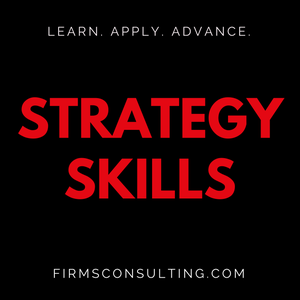 The Strategy Skills Podcast: Strategy | Leadership | Critical Thinking | Problem-Solving
The Strategy Skills Podcast: Strategy | Leadership | Critical Thinking | Problem-Solving
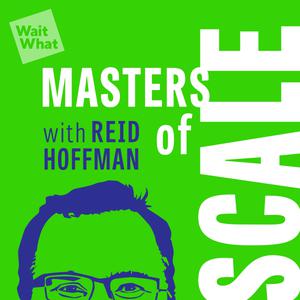 Masters of Scale
Masters of Scale
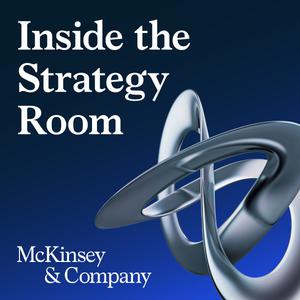 Inside the Strategy Room
Inside the Strategy Room
 CFO Weekly
CFO Weekly
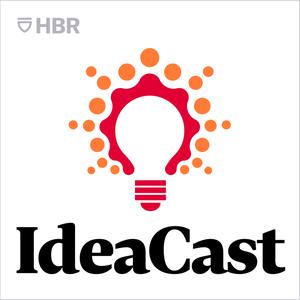 HBR IdeaCast
HBR IdeaCast
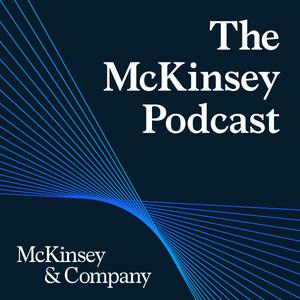 The McKinsey Podcast
The McKinsey Podcast